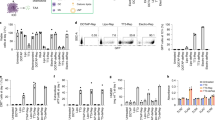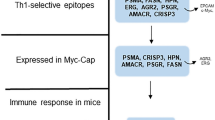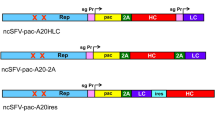Abstract
Insulin-like growth factor-1 (IGF-1) is expressed in many tumor cell lines and has a role in both normal cell proliferation and in the growth of cancers. Tumor cells transfected with a vector encoding an IGF-1 antisense cDNA transcriptional cassette driven by the mouse metallothionein-1 promoter become immunogenic and lose their tumorigenicity in syngeneic animals. The enhanced immunogenicity is associated with an up-regulation in the expression of major histocompatibility complex class I molecule on cell surfaces. Blockade of the expression of IGF-1 in tumor cells by the IGF-1 antisense RNA approach is not uniformly effective in the induction of antitumoral protective immunity in low and nonimmunogenic tumor model systems. Here, we report that the immunogenicity of hepa 1–6 hepatoma and SMCC-1 colon carcinoma cells, which are poorly immunogenic and unresponsive to antisense IGF-1 gene transfer, can be induced by cotransfection with genes encoding antisense IGF-1 and mouse B7.1 molecules. The tumor cells modified in this manner become strongly immunogenic and can be used as a cellular vaccine to induce a protective immune response in vivo. Immunization with the transfected tumor cells also results in regression of the established hepa 1–6 hepatoma and SMCC-1 colon cancer. The immunity is tumor-specific and is mediated by CD3+CD8+ T cells. Cytotoxic T lymphocytes generated in vitro by priming naive spleen cells and in vivo by immunizing mice with the double-transfected tumor cells specifically lysed autologous tumors cells and were effective in adoptive immunotherapy. The data suggest that modification of tumor cells in vitro by cotransfection with genes encoding antisense IGF-1 and B7.1 molecules may open a new avenue for cancer immunogene therapy.
This is a preview of subscription content, access via your institution
Access options
Subscribe to this journal
Receive 12 print issues and online access
$259.00 per year
only $21.58 per issue
Buy this article
- Purchase on Springer Link
- Instant access to full article PDF
Prices may be subject to local taxes which are calculated during checkout
Similar content being viewed by others
Author information
Authors and Affiliations
Corresponding author
Rights and permissions
About this article
Cite this article
Liu, Y., Wang, H., Zhao, J. et al. Enhancement of immunogenicity of tumor cells by cotransfection with genes encoding antisense insulin-like growth factor-1 and B7.1 molecules. Cancer Gene Ther 7, 456–465 (2000). https://doi.org/10.1038/sj.cgt.7700137
Received:
Accepted:
Published:
Issue Date:
DOI: https://doi.org/10.1038/sj.cgt.7700137
Keywords
This article is cited by
-
IGF-1 increases survival of CD4+ lineage in a 2D model of thymocyte/thymic stromal cell co-culture
In Vitro Cellular & Developmental Biology - Animal (2022)
-
Enhanced antitumor effect of combined replicative adenovirus and nonreplicative adenovirus expressing interleukin-12 in an immunocompetent mouse model
Gene Therapy (2003)
-
Cancer immunogene therapy: A review
Journal of Biomedical Science (2003)



